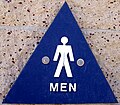性別記号
表示
(ジェンダーシンボルから転送)
性別記号(せいべつきごう)またはジェンダーシンボル(英語: gender symbol)とは、生物学的性別または社会学的性別(ジェンダー)の別を表すための記号である。生物学・医学、系図、アイデンティティ政治・LGBT関連で用いられる。
男性と女性を表すピクトグラムは公衆便所を表す記号として使用されているが、これは1960年代から広く使用されるようになったものである[1][2][3]。
生物学・医学
[編集]1751年、カール・フォン・リンネはこれらの記号を植物の性別(ほとんどの植物は雌雄同体であるが、ここでは交配種における親個体の性別を指す)を表すのに用いた[4]。
性別記号は、科学関連の出版物において、患者などの個体の性別を示すために依然として使用されている[5] 。現在、科学論文に掲載されている血統図では、雄は正方形、雌は円を使用する[6]。
| 記号 | Unicode | JIS X 0213 | 文字参照 | 名称・備考 |
|---|---|---|---|---|
| ♂ | U+2642 |
1-1-73 |
♂♂ |
雄記号 |
| ♀ | U+2640 |
1-1-74 |
♀♀ |
雌記号 |
| □ | U+25A1 |
1-2-2 |
□□ |
正方形。血統図で雄を表す[6]。三角形も用いられる。 |
| ○ | U+25CB |
1-1-91 |
○○ |
円。血統図で雌を表す[6]。 |
| ☿ | U+263F |
- |
☿☿ |
水星の記号。遺伝子解析などにおいて未成熟の雌を示すために使用される。また、植物学において雌雄同体を表す。 |
社会学
[編集]→詳細は「トイレの記号」を参照
性別記号のピクトグラムは公衆便所を表す記号としてよく用いられる。
-
DOTピクトグラム標準の記号
-
イギリスの標識例
-
イギリスの標識例
| 記号 | Unicode | JIS X 0213 | 文字参照 | 名称 |
|---|---|---|---|---|
| 🚹 | U+1F6B9 |
- |
🚹🚹 |
MENS SYMBOL (SoftBank絵文字) |
| 🚺 | U+1F6BA |
- |
🚺🚺 |
WOMENS SYMBOL (SoftBank絵文字) |
| 🚻 | U+1F6BB |
- |
🚻🚻 |
RESTROOM (iモード絵文字・EZweb絵文字・SoftBank絵文字) |
派生
[編集]1970年代以降、性的指向やアイデンティティ政治を表現するために、性別記号の変種が使用されるようになった。この最初の例は、男性同性愛を表すために、雄記号を2つ重ねたものである[7]。
2000年代以降、性別記号の多くの変種がLGBT関連で導入されてきた。これらの記号の一部は、Unicodeにおいて、2005年のバージョン4.1で新設されたその他の記号ブロックに採用されている。
→詳細は「LGBTQのシンボル」を参照
| 記号 | Unicode | JIS X 0213 | 文字参照 | 名称・備考 |
|---|---|---|---|---|
| ⚢ | U+26A2 |
- |
⚢⚢ |
女性同性愛 |
| ⚣ | U+26A3 |
- |
⚣⚣ |
男性同性愛 |
| ⚤ | U+26A4 |
- |
⚤⚤ |
異性愛(または両性愛) |
| ⚥ | U+26A5 |
- |
⚥⚥ |
トランスジェンダー |
| ⚦ | U+26A6 |
- |
⚦⚦ |
トランスジェンダー |
| ⚧ | U+26A7 |
- |
⚧⚧ |
トランスジェンダー |
関連項目
[編集]出典
[編集]- ^ 世界中に広まる男女が並ぶトイレマークは、日本で生まれたって本当?【日本の不思議】。『絵を使って何らかの意味を指し示すデザインは、世の中にたくさん。そのうちトイレのマークは、1964年の東京オリンピックで全面的に採用され、世界に大きく広まったという歴史があると言われています。』
- ^ “【発見!】 世界に普及したトイレのマーク(絵文字・ピクトグラム)は日本発と知ってましたか?”. 2017年12月6日閲覧。
- ^ sex-segregated public bathrooms existed since at least the 1880s, originally labelled in writing. The stick-figure pictograms were popularized with their introduction by British Rail in the 1960s. The genius behind the stick figure toilet signs, BBC Future (2014). "One of the best early examples of intuitive global signs for public lavatories was that created for British Rail in the mid-1960s. [...] In the 1970s, the British example was developed on a more comprehensive basis in the United States. In 1974, the US Department of Transportation commissioned the American Institute of Graphic Arts to create a set of pictograms to be used throughout public transport networks whether road, rail, air or sea." "In Poland, meanwhile, you can come across lavatories indicating “gents” with a triangle and “ladies” with a circle, while in Lithuania men are represented by an inverted pyramid and women by a pyramid standing the right way up."
- ^ Stearn, William T. (May 1962). “The Origin of the Male and Female Symbols of Biology”. Taxon 11 (4): 109–113. doi:10.2307/1217734. JSTOR 1217734.
- ^ Zhigang, Zhigang (25 September 2009). “A HIV-1 heterosexual transmission chain in Guangzhou, China: a molecular epidemiological study”. Virology Journal (BioMed Central) 6 (148): Figure 1. doi:10.1186/1743-422X-6-148 31 December 2015閲覧. "(Mars male gender symbol) indicates male; (female Venus gender symbol) indicates female"
- ^ a b c Schott, G D (24 Dec 2005). “Sex symbols ancient and modern: their origins and iconography on the pedigree”. BMJ (British Medical Journal) 331 (7531): 1509–1510. doi:10.1136/bmj.331.7531.1509 31 December 2015閲覧。.
- ^ “Symbolism”. LGBTQA+ WebCenter. Eastern Illinois University. 31 December 2015閲覧。 “Double interlocking female symbols are often been used [sic] to symbolize lesbianism, but some feminists have instead used the double female symbols to represent sisterhood among women and three interlocking female symbols to denote lesbianism. In the 1970’s, some lesbian feminists used three interlocking female symbols to represent their rejection of male standards of monogamy.”



